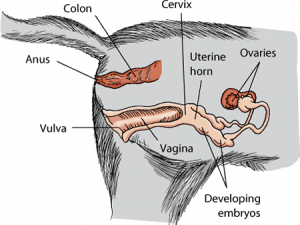Ovariectomy is one of the methods of surgical sterilisation in female dogs; it consists of removing the ovaries, permanently preventing reproduction and the heat cycle. It is “said” that the dog must be given birth at least once before being sterilised, this has no scientific basis, but it is advisable to sterilise her before she is four years old and not when she is in heat!

There are two known methods of performing the operation, the classic one, which is the most widely used, and laparascopy, which is more expensive. The latter is called mini-invasive and consists of inserting a microcamera through small flowers in the abdomen and manipulating the organs using surgical instruments guided from the outside. The abdomen insufflated with carbon dioxide forms an operating dome, the one centimetre incision allows trocars to locate the ovaries and thus allow exportation. Everything is kept to a minimum post-operatively: reduced pain, mild sedation, no need for an Elizabethan collar, rapid resumption of one’s habits.
Associated with ovariectomy is ovariohysterectomy, where both the ovaries and the uterus are removed. Needless to say, the latter is more invasive in classical surgery and less so in laparascopic surgery. For any type of intervention it is always better to consult your vet, and it is important to know that laporascopy has a higher price than the classic operation, due to the high cost of the equipment, the long training of the doctors and the suitable structure.
The bitch generally becomes productive at around ten months of age and begins her first cycle, we are talking about two estrous cycles twice a year. During this period she will be more restless, feeling the need to mate, marking her territory and trying to escape.
With sterilisation we will eliminate the risk of unwanted pregnancies, less risk of mammary tumours, complete removal of the uterus will eliminate a deadly infection called pyometra. The bitch’s personality will not change, only the behaviour related to sexual hormones. They tend to relax and seek more cuddles from their owners. It should be noted that due to the slowing of the metabolism they are more likely to gain weight, a proper diet for neutered dogs is the best!!!
There are various debates about whether or not to sterilise a dog. Many think that it is like making him handicapped in his attributes is despicable to him and would constitute violence against him. But most of us think instead that we are improving the quality of his life because he would no longer be subject to possible hysterical pregnancies etc….
An important look goes to hereditary defects, which are the cause of many puppy deaths and of which sterilisation is a very useful weapon to prevent catastrophe. It is also important to avoid straying and overcrowding in kennels where it is compulsory to adopt them. In all cases, always consult your vet before deciding what to do, and evaluate everything with the utmost care and respect for your four-legged friend.